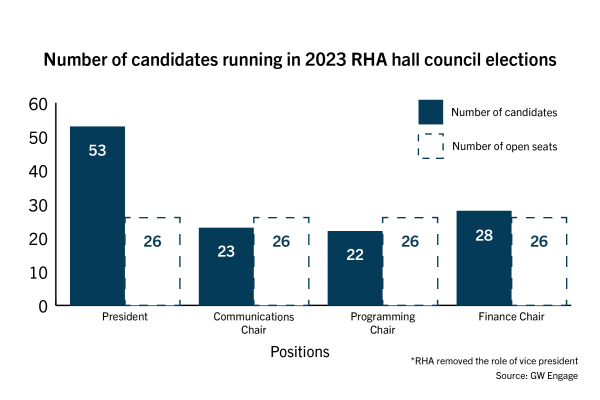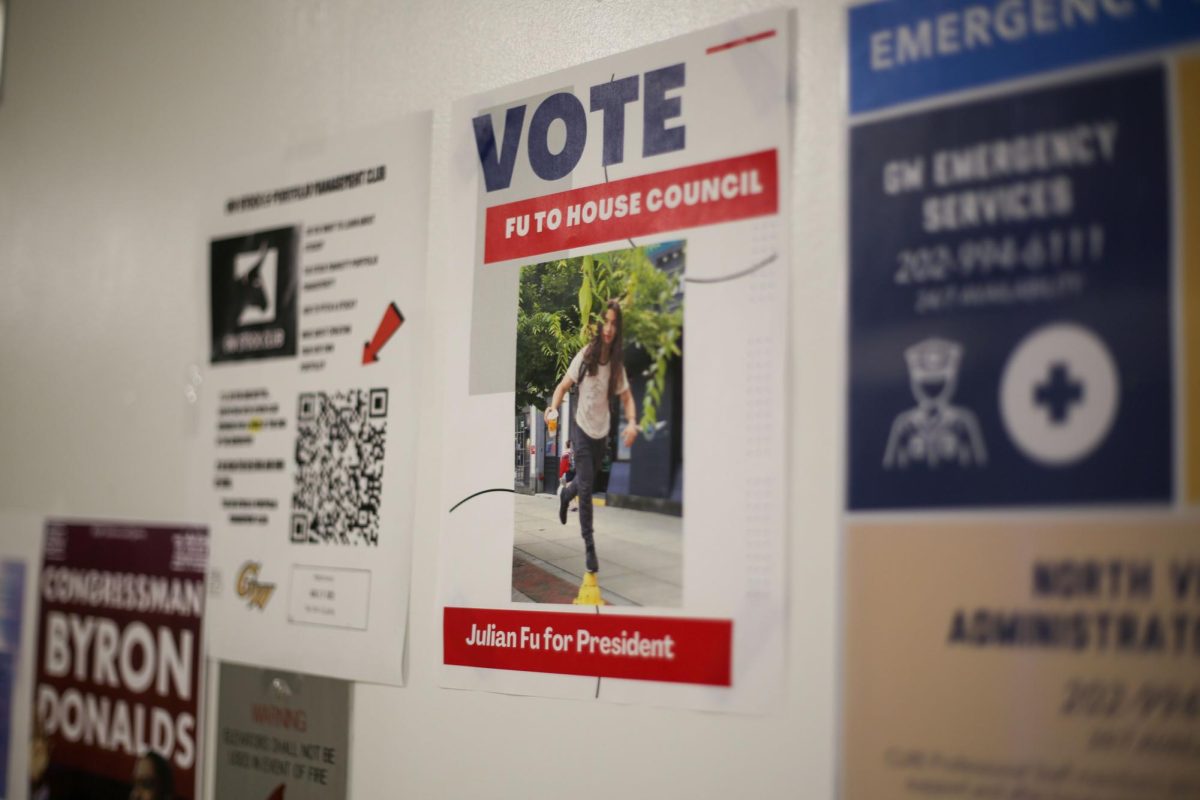Posters with your next-door neighbor’s headshot, self-promotional messages in your GroupMe and dress-up debates in first-year residence halls: Welcome to the Residence Hall Association’s hall council elections.
Last week, 126 students vied for 104 spots on their hall councils, a quasi-mini-government under the umbrella of the RHA that oversees events and governance within each of GW’s 26 residence halls. The RHA will announce the election winners Monday.
At least 34 races have no candidates this year, according to an email sent to residents Tuesday. Despite the expected vacancies, RHA President Vero Famadas said they are satisfied with the number of candidates running this year — 147 students ran for 130 seats last year — considering the changes the student organization made to councils, like removing the vice president role from hall councils to limit redundancy in their work and allow each member to take a more active role.
“We’re really happy with the numbers because it’s on par with last year,” said Famadas.

Students are running to become hall council president, communications chair, programming chair and finance chair.
Famadas said the elected president of the hall council can nominate students to fill any vacant seats that do not garner write-in candidates. In elections where three or more candidates ran for a seat, students could rank candidates in order of preference.
“It’s still a great way to make sure people are involved,” Famadas said.
Famadas said the RHA was unable to hold its informational session for prospective candidates on the Foggy Bottom campus due to the shelter-in-place order last week, but RHA members have sent numerous emails and responded to questions about campaigns over Instagram.
Famadas said upperclass students have shown “equal” enthusiasm for hall council positions as first-year counterparts this year — a departure from the norm, where first-year halls tend to show more enthusiasm. They said upperclass students have advocated for a broader sense of community in residence halls.
“There’s kind of a distance between neighbors,” Famadas said.
Clai Kastner, one of seven first-year students running to be the president of Somers Hall, said she has documented long lines of students waiting for the Vex, and she has to leave more than an hour before her class to make it on time. She said she hopes to advocate for the Mount Vernon Campus if elected president of Somers.
“My main motivation is just making sure that everyone feels heard and trying to push for improvements to live for people on the Vern,” Kastner said.
Kastner said about 40 people attended the debate in Somers Hall.
“It was civil, the moderation went really well,” Kastner said. “There weren’t any problems between candidates, everyone performed well.”
More than 50 students crammed into the basement of Potomac House to attend its hall council presidential debate.
Kastner said that had the RHA kept the vice presidential role in hall councils, she likely would have run for that position instead. She said the removal of the vice presidential role may have resulted in crowded presidential races.
Forty-two percent of the total candidates are running for president of their hall council.
Stephen Garvey, a sophomore and one of four candidates for president of District House, said when he moved into District last year as part of affinity housing, he was “disappointed” to see a lack of a sense of community throughout the hall. He said his friend, Henry-Scriven Young, ran as president of Mitchell Hall and hosted events like free grab-and-go breakfasts last year, which inspired him to coordinate more frequent free breakfast events in residence halls.
“If we can do something like that more often, then that’s a good thing for the school,” Garvey said.
Ethan Lynne, a sophomore who served as president of Thurston Hall last year and is the president-elect of Shenkman Hall this year, said this year’s campaign has been “smoother” than last year’s because the RHA has more clearly set out the required deadlines for campaign procedures, rules of campaigning and disqualification policies.
He said he plans to use his prior experience with RHA to advocate for additional water fountains and improvements to the courtyard and market in Shenkman Hall.
“Overall, they’ve been very responsive, and of course, they’ve postered everywhere encouraging people to run,” Lynne said. “I think there’s been a lot of interest.”





